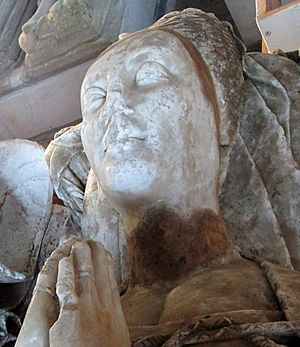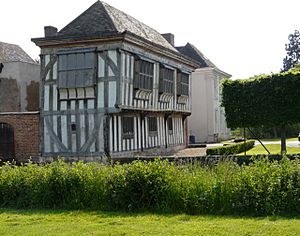Margaret Willoughby facts for kids
Quick facts for kids
Margaret Willoughby
|
|
|---|---|

from her tomb
|
|
| Born |
Margaret Freville
1401 |
| Died | 1493 |
| Nationality | Kingdom of England |
| Known for | landowner |
| Spouse(s) | Hugh Willoughby |
| Children | eleven |
Margaret Willoughby (born Margaret Freville, 1401 – 1493) was an important English woman who owned a lot of land. She was known as Lady Willoughby and later Margaret, Lady Bingham. She was a powerful figure in her family during the 15th century.
Contents
Margaret's Life Story
Becoming Lady Willoughby
Margaret Freville was an heiress, meaning she was set to inherit a lot of land and wealth. Around 1419, she became the second wife of Hugh Willoughby. Hugh's first wife had passed away, leaving him with two sons. Margaret brought a significant income to their marriage, about £200 a year, from her family's lands in Herefordshire, Nottinghamshire, and Warwickshire.
Margaret and Hugh became some of the richest people among the gentry (a class of wealthy landowners) in the English Midlands. In 1429, Hugh was made a knight at the coronation of Henry VI of England. This meant Margaret became Lady Willoughby. Their wealth grew even more. Hugh gained ownership of the important Middleton manor in Warwickshire. He also acquired a large amount of silver, which had been won in a battle.
Challenges with Inheritance
In 1448, Hugh Willoughby passed away. His will, which is a legal document about how someone's property should be divided after their death, caused some disagreement. Hugh had made sure his eleven children with Margaret would receive a good amount of money and property. However, his two sons from his first marriage felt they did not receive what they expected.
Margaret was left in charge of the entire Willoughby estate. The will also said that Margaret and Hugh's children would inherit the estate. It even mentioned any future rightful heirs Margaret might have, which was unusual.
Richard Willoughby, Margaret's stepson, was unhappy. He received nothing directly from the will. He also knew that when Margaret eventually died, he would get much less than he thought he should.
After Margaret had been a widow for exactly one year, two important people, Ralph, Lord Cromwell, and Sir John Fortescue, made a decision about the will. They decided to reduce the amount of wealth Margaret would control. The manor at Woolaton was given to Richard Willoughby. Other manors that were meant for Margaret and her heirs were also transferred to Richard. Richard Willoughby later died in 1471 without having any children.
Later Life and Legacy
Margaret lived for more than 50 years after her husband Hugh Willoughby died. Her long life meant that her children and grandchildren had to wait a long time to inherit their property. Her family members were very skilled in law. Margaret later married Richard Bingham, who was a judge in the King's Bench, a high court. Richard lived and died in Middleton in 1476.
Margaret herself died in 1493. She left her partial control of the Middleton manor to her grandson, Sir Henry Willoughby. Henry's career became very successful. He was involved in an event where a wealthy woman named Jane Statham was taken away and forced to marry his brother, Richard. This incident is thought to have led to a change in English law. The law was changed to make it a serious crime (a felony) to abduct a woman who owned property.
 | Jewel Prestage |
 | Ella Baker |
 | Fannie Lou Hamer |


